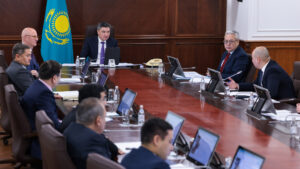ASTANA – Kazakhstan is making efforts to expand its share in the global production of rare and rare earth metals. The government meeting chaired by Kazakh Prime Minister Olzhas Bektenov on Nov. 13 discussed the industry’s development to enhance Kazakhstan’s position in the global market, attract technology and finance, and increase its involvement in the supply chain in new sectors of the economy.

Olzhas Bektenov stressed that the government will provide support to domestic research institutes and manufacturers. Photo credit: Prime Minister’s press service.
Kazakhstan is home to one of the world’s three full-cycle factories for beryllium and scandium production and one of four worldwide tantalum and niobium manufacturers, reported the Prime Minister’s press service.
According to the Ministry of Industry and Construction, the country’s metallurgical plants extract bismuth, antimony, selenium, and telluride and use technologies to produce gallium from alumina and indium from polymetallic raw materials. In November, tungsten concentrate production launched at the Boguty deposit in the Almaty Region, with a capacity of up to 3.3 million tons. The total investment in the project was $350 million.
Work is being done on prospective initiatives such as tungsten ore development, improving raw material processing to ammonium paratungstate, and establishing a magnet production cluster.
The meeting participants also discussed the development of sectors for battery materials, permanent magnets, recycling, and heat-resistant alloy production. Projects to extract and process the essential metals are being implemented. Thus, graphite concentrate will be produced and processed into final goods at one of the world’s largest deposits, Sarytogan.
Kazakhstan has begun producing manganese sulfate monohydrate this year, accounting for 5% of the global market. Bergbau AG, a German business, is also working on lithium deposit development projects, while the Korean institution KIGAM is undertaking geological and geophysical investigations on lithium in the East Kazakhstan Region.
At the same time, it is planned to establish the production of heat-resistant nickel alloys, which make up to 50% of the cost of jet aircraft engines, based on rhenium, tantalum, tungsten, nickel and cobalt. The country has established the processing of scrap aircraft engine blades.
